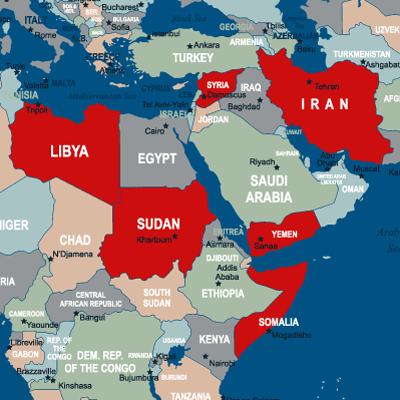On March 6, 2017, President Trump signed a new executive order which revises the former travel ban issued in January of this year, which was halted by a federal court judge last month. Read the text of the order ›
The new ban applies to individuals from the Muslim-majority countries of Iran, Libya, Somalia, Sudan, Syria, and Yemen, but omits Iraq. The new ban goes into effect next Thursday, March 16. In announcing the effective date, the Trump administration sought to avoid the chaos it created with the first ban, which went into immediate effect and invalidated visas while people were en route to the U.S.
The ban applies to the following individuals from the designated countries who:
- Are outside the United States on March 16, 2017;
- Did not have a valid visa at 5:00 p.m., eastern standard time on January 27, 2017; and
- Do not have a valid visa on the effective date of this order.
The revised travel ban will be in effect for 90 days. After that time, the Trump administration may make changes, including adding countries or making the ban permanent. The new order also suspends the refugee/asylum program for 120 days. After that, the U.S. will only accept a maximum of 50,000 refugees annually into the country, down substantially from the 110,000 a set by the Obama administration. In justifying the halt to the refugee program, the order states that “more than 300 persons who entered the United States as refugees are currently the subjects of counterterrorism investigations by the Federal Bureau of Investigation.” However, a breakdown of the home countries and immigration statuses of those refugees mentioned were not disclosed.
Possible Waivers
The order also states that a foreign national from one of the banned countries could seek a waiver. Waivers will be assessed on a case-by-case basis. Among the scenarios mentioned that might be eligible for a waiver include a foreign national:
- Seeking to re-enter the U.S. to resume his/her studies.
- Seeking to enter the U.S. for significant business or professional reasons.
- “Employed by, or on behalf of” the U.S. government or “conducting meetings or business” with the U.S. government.
- Wanting to “visit or reside” with a close family member who is either a U.S. citizen, permanent resident, or has a valid nonimmigrant visa.
In applying for a waiver, a foreign national would need to show that:
- Denied entrance to the U.S. would cause undue hardship.
- Her/his entry into the U.S. would not pose a threat to national security.
- Her/his entry into the U.S. would be in the national interest.
Despite changes to the ban, the intent is the same. Instead of focusing attention and resources on the people who actually pose a threat to the U.S., the Trump administration has chosen to scapegoat Muslims, overreach with this policy, possibly illegally, and compromise the moral authority of the U.S. in the world.
What Should You Do If You Hold a passport from Iran, Libya, Somalia, Sudan, Syria, or Yemen?
If you:
- Are currently outside the U.S. and have a valid visa, you should return to the U.S. before March 16.
- Do not have a valid visa, consider filing a waiver for entry to the U.S.
- Have a valid visa that will be expiring soon, consider coming to the U.S. as soon as possible before the visa expires. You will be allowed to stay until the date of the I-94 stamp marked in your passport. Under some circumstances, it may be possible to apply for an extension to remain in the U.S. beyond this date.
- Are currently in the U.S. and are eligible to apply for adjustment of status to permanent residence in the U.S. you should consider doing so as soon as possible
- Are eligible to apply for U.S. citizenship through naturalization you should do so as soon as possible.

